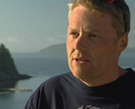|
INTERVIEW
TRANSCRIPT - Dr. John Volpe
The future plans are very worrying. The individual states along the West Coast particularly have run across very strident oppositions with the coastal aquaculture model. So the motivation now on the part of the federal government is to remove the jurisdiction from the states, off shore and in the economic exclusion zone. We’re moving coastal or state input in the decisions. We’re taking a very flawed model that is essentially a net loss of protein production and then amplifying that model hundreds, perhaps thousands of times. It is going to be that much greater of a footprint, that much greater of an effect on the environment.
I would say no, we are not fishing out the oceans. There are plenty of fish out there. The problem is if we were creating food we would not be engaging in aquaculture in this manner whatsoever. This is a profit-generating enterprise. The economies of scale that are being talked about in the offshore industry is about generating profit, not about generating food.
The motivation for the offshore push given to the public is one of national security. The American foreign national debt is greatest in oil, second in cars, and seafood is the next largest sector of trading deficit in the United States. With homeland security and a new and very high profile in the public discourse, there seems to be a need, or there is a projected need to provide seafood domestically for consumption. This is really a money grab and is the leading edge of the privatization of the offshore environment, the last common, truly common environment left on this earth.
It is clearly the aquaculture industry and it’s being pushed under the guise of a blue revolution that we’re going to feed the world. But we’re going to use a method that is a net protein loss, and to do that obviously makes very little sense whatsoever. This is the leading edge of a privatization that has a much broader horizon. With just aquaculture, we’re looking at tapping the common resources in the ocean itself. So oil and gas are obviously big ones, but there are many others. We’re after industries right now that can’t be engaged in, because it is a common resource. Once the template is there, via aquaculture, then the door opens very widely to the privatization of the ocean.
That’s in part of the regulations of the offshore industry. If we simply look at what kind of regulations are in play around the traditional coastal industries, I think the scientific community speaks with a single voice that they are no where near adequate, for instance with the traditional net pen systems.
The offloading of costs of production is being absorbed by the commons. When we move this industry out into the offshore, the offloading is going to be just that much greater. Therefore we the people who own this common resource are going to be asked to absorb just that much more.
The best way to go about it is twofold. One, consumers have to educate themselves and be conservationists with their wallet. They should support those industries that support their environmental concerns and don’t give support to those that don’t, obviously. But also second, we need to be a little more creative. Aquaculture is the way of the future, there’s definitely room for aquaculture on this coast. What there is not room for is this simple Wild West, money grubbing, economic bottom-line-only model. We need to produce food, not profit. Has anybody commented on the fact that it’s not the industries fault and they’re only doing what they’re being allowed to do by government? It’s the same level of thinking that brought down the commercial fishery and other extractive resources like the forestry industry. Now we’re using that same flawed logic in the development of the aquaculture industry. We need to remember that the industry itself is not completely to blame here. It’s the complicity on the part of the managers and policy makers that are supposed to be looking out for our best interest. They are literally asleep at the switch. But somebody must make the point that aquaculture is the way of the future. It’s not a black or white situation. There is room in the world for aquaculture and commercial fisheries. Unfortunately, the way it’s going right now is that commercial fisheries are out and aquaculture’s in, and so costs begin.
Aquaculture
definitely has a bright future; however the way that we’re
engaging it right now is obviously patently false. There’s
room for aquaculture but it’s going to call for a level of
thinking that simply isn’t being enacted at this point. |
 Dr.
John Volpe is the Assistant Professor of Invasion and Fisheries
Biology at the University of Alberta.
Dr.
John Volpe is the Assistant Professor of Invasion and Fisheries
Biology at the University of Alberta.